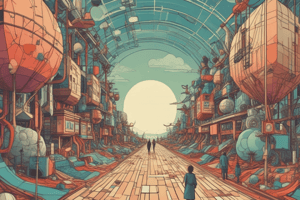Podcast
Questions and Answers
Which of the following paradigms focuses on the larger societal structures and their functions?
Which of the following paradigms focuses on the larger societal structures and their functions?
- Postmodernism
- Symbolic Interactionism
- Conflict Theory
- Structural Functionalism (correct)
Conflict Theory primarily views society as harmonious and stable.
Conflict Theory primarily views society as harmonious and stable.
False (B)
Who is the originator of Symbolic Interactionism?
Who is the originator of Symbolic Interactionism?
Max Weber
In Structural Functionalism, the term '__________ Functions' refers to the intended effects of a structure.
In Structural Functionalism, the term '__________ Functions' refers to the intended effects of a structure.
Match the following sociological paradigms with their key focus:
Match the following sociological paradigms with their key focus:
Which type of conflict is associated with Karl Marx?
Which type of conflict is associated with Karl Marx?
Latent Functions are the obvious and intended effects of social structures.
Latent Functions are the obvious and intended effects of social structures.
Which type of formal organization is primarily focused on achieving business goals?
Which type of formal organization is primarily focused on achieving business goals?
Which term describes the internal conflict African Americans experience while seeing themselves through a prejudiced society's lens?
Which term describes the internal conflict African Americans experience while seeing themselves through a prejudiced society's lens?
Deviance is always considered negative behavior that harms society.
Deviance is always considered negative behavior that harms society.
What is the term for the process of adjusting to a new culture or environment, especially in total institutions like prisons?
What is the term for the process of adjusting to a new culture or environment, especially in total institutions like prisons?
Max Weber argued that modernity was characterized by a shift towards traditionalism.
Max Weber argued that modernity was characterized by a shift towards traditionalism.
Bureaucratic organizations face several problems, including inefficiency and _____ ritualism.
Bureaucratic organizations face several problems, including inefficiency and _____ ritualism.
What does Gender-Conflict Theory focus on?
What does Gender-Conflict Theory focus on?
The ________ promoted a work ethic that contributed to the rise of modern capitalism according to Weber.
The ________ promoted a work ethic that contributed to the rise of modern capitalism according to Weber.
Match the following types of norms with their descriptions:
Match the following types of norms with their descriptions:
Match the following key figures or concepts with their corresponding contributions or theories:
Match the following key figures or concepts with their corresponding contributions or theories:
What was the main focus of the First Wave of feminism?
What was the main focus of the First Wave of feminism?
The legacy of Harriet Martineau gained feminist recognition in the 1970s.
The legacy of Harriet Martineau gained feminist recognition in the 1970s.
Society structured by racial tensions due to unequal resources and power is described by ________ Theory.
Society structured by racial tensions due to unequal resources and power is described by ________ Theory.
Who is known as a pioneer for making sociology more accessible through various writings?
Who is known as a pioneer for making sociology more accessible through various writings?
What type of society is characterized by small, nomadic groups focused on survival?
What type of society is characterized by small, nomadic groups focused on survival?
Agrarian societies arose around 10,000 years ago.
Agrarian societies arose around 10,000 years ago.
Name one of the sociologists who proposed that economic change requires class struggle.
Name one of the sociologists who proposed that economic change requires class struggle.
The shift from agricultural to industrial societies is driven not just by technology but also by __________.
The shift from agricultural to industrial societies is driven not just by technology but also by __________.
Match the type of society with their primary characteristics:
Match the type of society with their primary characteristics:
What is a key effect of sociocultural evolution as described in the content?
What is a key effect of sociocultural evolution as described in the content?
Durkheim distinguished between mechanical solidarity and organic solidarity.
Durkheim distinguished between mechanical solidarity and organic solidarity.
What societal change is characterized by the growth of public institutions?
What societal change is characterized by the growth of public institutions?
In horticultural and pastoral societies, the domestication of __________ leads to surplus and specialization.
In horticultural and pastoral societies, the domestication of __________ leads to surplus and specialization.
What is the primary focus of primary groups?
What is the primary focus of primary groups?
The Milgram Experiment illustrated that groups have no influence on individual behavior.
The Milgram Experiment illustrated that groups have no influence on individual behavior.
Match the sociologist to their perspective on social change:
Match the sociologist to their perspective on social change:
What is the key difference between instrumental leadership and expressive leadership?
What is the key difference between instrumental leadership and expressive leadership?
The process of learning societal values within the family is called __________.
The process of learning societal values within the family is called __________.
Match the following types of groups with their definitions:
Match the following types of groups with their definitions:
During which psychosocial stage does the conflict between identity and role confusion occur?
During which psychosocial stage does the conflict between identity and role confusion occur?
Larger social groups tend to provide more stable but less personal interactions.
Larger social groups tend to provide more stable but less personal interactions.
What role does cultural capital play in socialization?
What role does cultural capital play in socialization?
The conflict between generativity and stagnation occurs during the age span of __________.
The conflict between generativity and stagnation occurs during the age span of __________.
Which of the following is NOT a characteristic of in-groups?
Which of the following is NOT a characteristic of in-groups?
Flashcards
Sociological Paradigms
Sociological Paradigms
Theoretical frameworks that guide how sociologists understand and interpret social phenomena.
Structural Functionalism
Structural Functionalism
Perspective that views society as a complex system with interconnected parts working together to maintain stability.
Conflict Theory
Conflict Theory
Views society as characterized by competition and struggle among groups for scarce resources.
Symbolic Interactionism
Symbolic Interactionism
Signup and view all the flashcards
Research Methods
Research Methods
Signup and view all the flashcards
Hypothesis
Hypothesis
Signup and view all the flashcards
Macro-level perspective
Macro-level perspective
Signup and view all the flashcards
Double Consciousness
Double Consciousness
Signup and view all the flashcards
Race Conflict Theory
Race Conflict Theory
Signup and view all the flashcards
Social Integration
Social Integration
Signup and view all the flashcards
Gender Conflict Theory
Gender Conflict Theory
Signup and view all the flashcards
Historical Exclusion
Historical Exclusion
Signup and view all the flashcards
Max Weber's concept of transition to Modernity
Max Weber's concept of transition to Modernity
Signup and view all the flashcards
Max Weber, rationalization
Max Weber, rationalization
Signup and view all the flashcards
Max Weber, Legitimacy in States
Max Weber, Legitimacy in States
Signup and view all the flashcards
Harriet Martineau
Harriet Martineau
Signup and view all the flashcards
Deviance
Deviance
Signup and view all the flashcards
Social Control
Social Control
Signup and view all the flashcards
Formal Organizations
Formal Organizations
Signup and view all the flashcards
Bureaucracy (Max Weber)
Bureaucracy (Max Weber)
Signup and view all the flashcards
Bureaucratic Problems
Bureaucratic Problems
Signup and view all the flashcards
Socialization
Socialization
Signup and view all the flashcards
Primary Socialization
Primary Socialization
Signup and view all the flashcards
Secondary Socialization
Secondary Socialization
Signup and view all the flashcards
Cultural Capital
Cultural Capital
Signup and view all the flashcards
Hidden Curriculum
Hidden Curriculum
Signup and view all the flashcards
Peer Influence
Peer Influence
Signup and view all the flashcards
Reference Groups
Reference Groups
Signup and view all the flashcards
In-Groups
In-Groups
Signup and view all the flashcards
Out-Groups
Out-Groups
Signup and view all the flashcards
Social Networks
Social Networks
Signup and view all the flashcards
Society
Society
Signup and view all the flashcards
Sociocultural Evolution
Sociocultural Evolution
Signup and view all the flashcards
Hunting & Gathering Societies
Hunting & Gathering Societies
Signup and view all the flashcards
Horticultural & Pastoral Societies
Horticultural & Pastoral Societies
Signup and view all the flashcards
Agrarian Societies
Agrarian Societies
Signup and view all the flashcards
Industrial Societies
Industrial Societies
Signup and view all the flashcards
Postindustrial Societies
Postindustrial Societies
Signup and view all the flashcards
Marx's View on Social Change
Marx's View on Social Change
Signup and view all the flashcards
Weber's View on Social Change
Weber's View on Social Change
Signup and view all the flashcards
Durkheim's View on Social Change
Durkheim's View on Social Change
Signup and view all the flashcards
Study Notes
Sociology Paradigms
- Definition: A framework of theories and concepts that shapes our perspective on different social topics.
- In Sociology: Theoretical Paradigms help sociologists understand and interpret raw facts; Perspectives shape questions asked at macro (large-scale) and micro (small-scale) levels.
Structural Functionalism
- Origin: Emile Durkheim viewed society as an organism with different parts working together for stability.
- Society's issues are viewed as illnesses disrupting societal health.
- Key Concepts: Social Structures (the framework of society), Social Functions (manifest - intended, and latent - unintended effects), and Social Dysfunctions (patterns disrupting society's functioning).
- Limitation: Struggles to address societal changes effectively and leads to conflict theory.
Conflict Theory
- Focus: Society as groups competing over scarce resources.
- Change: Driven by ongoing struggles between these groups.
- Key Conflicts: Class Conflict (Marx - capitalists vs. working class), Race Conflict (Du Bois - inequalities between racial groups), and Gender Conflict (inequalities between men and women).
Symbolic Interactionism
- Focus: Micro-level interactions and meanings people create in everyday life.
- Origin: Max Weber.
- Emphasizes individual experiences and shared realities through interactions (example: understanding a handshake as a shared social symbol).
- Key Difference: Structural Functionalism and Conflict Theory focus on Macro perspective, while Symbolic Interactionism focuses on Micro perspectives.
- Tip: Focus on the paradigm suited for the scale (macro or micro) of your sociological question.
Studying That Suits You
Use AI to generate personalized quizzes and flashcards to suit your learning preferences.




